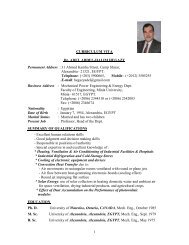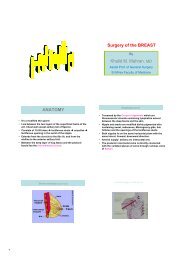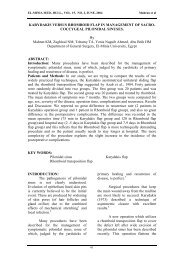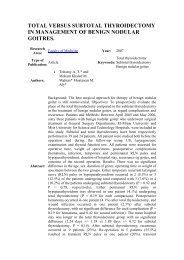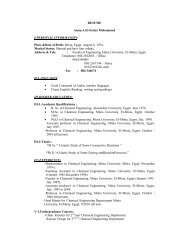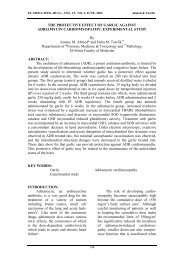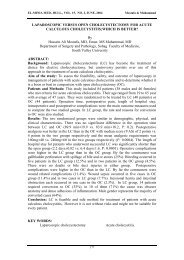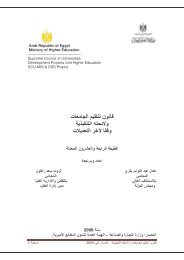- Page 1 and 2: I - ERECTILE DYSFUNCTION - DIAGNOSI
- Page 3: INDEX OF CONTENTS Acknowledgment RI
- Page 6 and 7: , ist of Abbreviations AVSS Audiovi
- Page 8 and 9: SHBG SSR! s U/ S SHIM Sex-Hormone B
- Page 10 and 11: Rigiscan, buckles TABLE 18 The resp
- Page 14: Aim of the Study Introduction and A
- Page 17 and 18: Review literature o DSM-IV also ask
- Page 19 and 20: t P; I -i _10 t / t 0 4 • Review
- Page 21 and 22: Review o/ literature Table (1) show
- Page 23 and 24: 1-1 Male Sexual Anatomy A- Gross an
- Page 25 and 26: was 8.8 t m Review of literature fl
- Page 27 and 28: Review of l Augmenting the septum t
- Page 29 and 30: periphery. In the flaccid state, th
- Page 31 and 32: whet , , 5'47 , 4 Otra . a■ it ti
- Page 33 and 34: Review of literature Hatzichristou
- Page 35 and 36: Review of literature 1. Dilatation
- Page 37 and 38: Nerves in penis (dorsal penile nerv
- Page 39 and 40: Review of literature damaged during
- Page 41 and 42: Ischiocavernosus Bulbocavernous Rev
- Page 43 and 44: Review of l and A 1 C -adrenergic r
- Page 45 and 46: tetrahydrobiop amino acid sequence.
- Page 47 and 48: Phosphodiesterase During, the retur
- Page 49 and 50: Serotonin Review of literature Raph
- Page 51 and 52: Review of literature prolactin's ac
- Page 53 and 54: Review of l (Montorsi et al (2002)
- Page 55 and 56: Review of literature Mannino and co
- Page 57 and 58: arteriogenic most likely related to
- Page 59 and 60: veno-occlusive 1991). In animal mod
- Page 61 and 62: Revicw of literature fibrosis v and
- Page 63 and 64:
CHAPTER: 2 Review of literature DIA
- Page 65 and 66:
• Neurological • Endocrine dise
- Page 67 and 68:
• Risk factor for atherosclerosis
- Page 69 and 70:
Review o f literature 2- If either
- Page 71 and 72:
Interpretation of the results Revie
- Page 73 and 74:
Review o f literature The basic ass
- Page 75 and 76:
Chapter -3 Definitions A-PRIAPISM R
- Page 77 and 78:
AUA GUIDE LINE FOR PRIAPISM EVALUAT
- Page 79 and 80:
Review of literature blood cells, l
- Page 81 and 82:
Review o frog leg position, screeni
- Page 83 and 84:
therapeutic aspiration (with or wit
- Page 85 and 86:
Al-Ghorab Review of literature Of t
- Page 87 and 88:
B- RAPID EJACULATION Review of lite
- Page 89 and 90:
Review a ff literature investigatio
- Page 91 and 92:
Review of l McCarthy (1998) suggest
- Page 93 and 94:
Self Help Techniques ivien Review o
- Page 95 and 96:
Corpus c Corpus s ponglosum Tunica
- Page 97 and 98:
Clinical Course Review of literatur
- Page 99 and 100:
Review of literature perious and in
- Page 101 and 102:
CHAPTER: 4 TREATMENT OF ERECTILE DY
- Page 103 and 104:
Review of literature interaction is
- Page 105 and 106:
Tolerability Review of literature N
- Page 107 and 108:
Review of literature Sildenafil and
- Page 109 and 110:
Review ( Tadalafil should be used w
- Page 111 and 112:
Atter Review of literature sildenaf
- Page 113 and 114:
4-Phentolamine, Phentolearnine, Rev
- Page 115 and 116:
Revieiv of literature used for test
- Page 117 and 118:
ased upon the etiology. The e The p
- Page 119 and 120:
E-Hormonal treatment Review of lite
- Page 121 and 122:
Review of literal lire satisfaction
- Page 123 and 124:
Review of literature covers these d
- Page 125:
Indications: Review of literature I
- Page 128 and 129:
2--Identification 1-Sexual Health I
- Page 130 and 131:
If yes how many packs per day and i
- Page 132 and 133:
Patients and Methods C-Liver functi
- Page 134 and 135:
Patients and Methods AMS Ambicore i
- Page 136 and 137:
In ally patients, ICI of phenylephr
- Page 138 and 139:
2-After treatment failure Patients
- Page 140 and 141:
Patients and Methods Criteria used
- Page 142 and 143:
Patients and Methods fatty) and he
- Page 144 and 145:
Peyrone's Disease Patients Patients
- Page 146 and 147:
Patients and Methods Treatment resp
- Page 148 and 149:
Penile prostheses patients Patients
- Page 150 and 151:
Patients and Methods 4-Next full-st
- Page 152:
EMLA Table (8) shows the S SRIs, Pa
- Page 155 and 156:
Table (9): Shows the ED presentatio
- Page 157 and 158:
( 73/ 459) . Low Table (11): , S'ho
- Page 159 and 160:
Results ejaculation ,7 with ED Peyr
- Page 161 and 162:
RIGISCAN RESULTS From our total 459
- Page 163 and 164:
! --, ntfr. stt: m • " • i t t
- Page 165 and 166:
of organic disease see table (17) .
- Page 167 and 168:
While there was a highly positive (
- Page 169 and 170:
Fierq Wsppto it Thirty- nine p pr 7
- Page 171 and 172:
Results cm/s (arteriogenic ED) see
- Page 173 and 174:
Dr. Frederic J. Levine 25-Feb-1983.
- Page 175 and 176:
Results Table (22): Shows the Table
- Page 177 and 178:
So , negative buckle test diagnosed
- Page 179 and 180:
81% 19% Results AMS 700 3 piece inf
- Page 181 and 182:
80 70 60 50 40 30 20 10 testosteron
- Page 183 and 184:
Results Regarding to treatments out
- Page 185 and 186:
Results Initial therapy failed in a
- Page 187 and 188:
Results 3 piece inflatable 700 AMS
- Page 189:
Results Paroxetine and/or Sertralin
- Page 192 and 193:
Discussion sexual dysfunction was a
- Page 194 and 195:
Both arterial insufficiency and c o
- Page 196 and 197:
Discussion Historically, hypogonadi
- Page 198 and 199:
Rigiscan testing was more sensitive
- Page 200 and 201:
Recently, PSV was found to be a mor
- Page 202 and 203:
Discussion erectile function domain
- Page 204 and 205:
Discussion A report on 210 patients
- Page 206 and 207:
Discussion Implanted inflatable pen
- Page 208 and 209:
Discussion infection, but device ex
- Page 210 and 211:
epiF Discussion For individuals on
- Page 212 and 213:
Discussion corpus spongiosum and co
- Page 214 and 215:
Discussion upon logical solutions (
- Page 217 and 218:
SUMMARY AND CONCLUSION Conclusion T
- Page 219 and 220:
Conclusion Sixty nine men presented
- Page 221 and 222:
Conclusion • Sildenafil citrate i
- Page 223 and 224:
1114411111311111
- Page 225 and 226:
References Anderson KE, Holmquist F
- Page 227 and 228:
Bechara A, et al, (1996): Prostagla
- Page 229 and 230:
References Broderick G.A & Harkaway
- Page 231 and 232:
References Chung W.S., Sohn J.H. &
- Page 233 and 234:
References Dinsmore WW, Hodges M, H
- Page 235 and 236:
Hind AC, (1984): Cavernosal alpha-b
- Page 237 and 238:
J m Gray A, Feldman HA, McKinlay &
- Page 239 and 240:
Helistrom Hellstrom Helistrom Helis
- Page 241 and 242:
References Jarow J P, Pugh V W, Rou
- Page 243 and 244:
Kloner Kloner Kloner RA, Hutter IS
- Page 245 and 246:
References c Lin CS, Lau A, Tu R, &
- Page 247 and 248:
Melis References McVary KT, Carrier
- Page 249 and 250:
Morisaki N, Kawano M. & Koyama N, (
- Page 251 and 252:
References Padma-Nathan H, Kaufman
- Page 253 and 254:
Piper PJ, (1973): Distribution and
- Page 255 and 256:
References Roose S P, Glassman A H,
- Page 257 and 258:
References Schramek P, Dorninger W
- Page 259 and 260:
Soderdahl References DW, Thrasher'
- Page 261 and 262:
Toblli Taylor S, Sutherland GR, G M
- Page 263 and 264:
Wagner G& Uhrenholdt A, (1980): Blo
- Page 266 and 267:
- Patient's Name No sexual activity
- Page 268 and 269:
DEPRESSION INVENTORY Instructions f
- Page 270 and 271:
Do you have a high blood pressure?
- Page 274 and 275:
1999_L U , t< 11 . 0 ! ; 3 . 1. J "
- Page 276:
0 = & * J i 4 l t 4 4 ) 1 = k p i j






